How Voice Search Is A Game Changer For eCommerce Marketing?
“Hey Google, find the best deals on running shoes”.
This simple command reflects how voice search assistants like Google Assistant, Alexa, and Siri have seamlessly integrated into our daily lives.
With the ability to provide instant answers and perform tasks hand-free, voice search in eCommerce is changing how people shop and interact with brands online. Voice assitants allows users to ask questions conversationally, and its popularity is rising.
According to Google, 27% of the global online population uses voice search on mobile devices.
For eCommerce businesses, this shift is monumental. Instead of typing in search queries, customers are now relying on voice commands to find products, compare prices, and make purchases. Voice search for eCommerce marketing is a game-changer, enabling brands to improve customer experiences, increase visibility, and drive sales.
This blog will delve into how voice search is reshaping the eCommerce landscape and strategies for businesses to adapt.
Understanding Voice Search in eCommerce
Voice search is exactly what it sounds like— search by voice. Users can speak commands or ask questions to smartphones or smart speakers. These devices process the speech and respond accordingly, whether by answering a query or performing a task.
But what is voice search in eCommerce? It’s a simple way customers use speech to find products, compare prices, and make purchases online. This technology simplifies shopping by offering a faster and hands-free experience. With the growing popularity of voice assistants like Alexa and Google Assistant, is becoming essential for online stores to stay competitive.
How Does Voice Search Work?
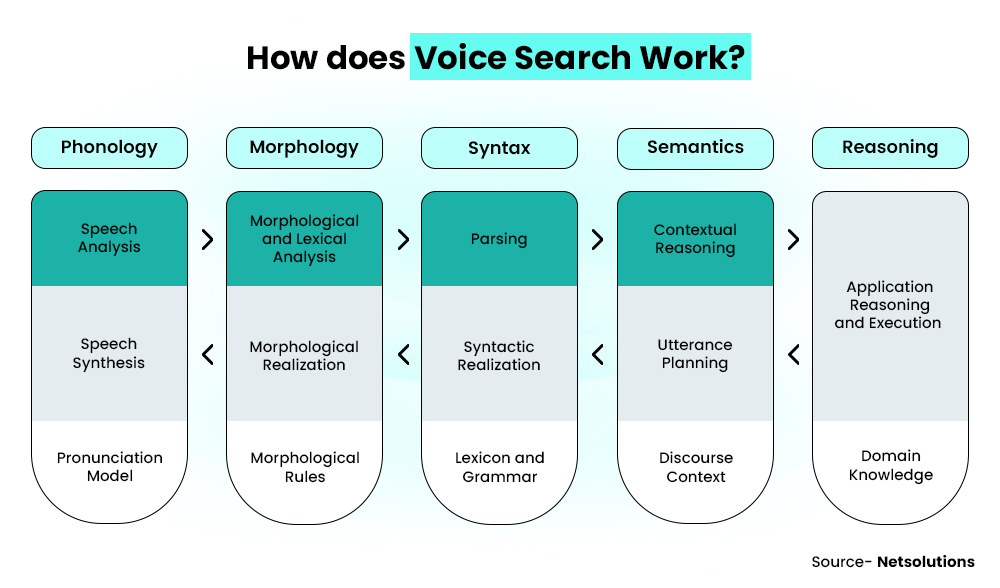
The main thing that differentiates humans from other species is language. Scientists spent decades on Speech Recognition Technology (SRT) in machines that can speak like humans and they developed different Language Learning Modules (LLMs) and Machine Languages.
This technology now exists in most mobile devices and smart speakers. Here are five steps through which voice search works:
- A voice searcher commands a voice search device with some key phrases (like “Hey Alexa, Ok Google, Siri) followed by the question.
- Human speech is then processed and transcribed by a digital voice assistant into text.
- This device then interprets the text by detecting questions or commands.
- It connects to external data sources like search engines to find relevant information.
- It then translates the data into a digestible format and completes the user’s intent.
The Growing Impact of Voice Search in eCommerce
A key reason customers prefer voice search for eCommerce is speed. Studies show that 71% of consumers would rather use voice search than typing for online queries. Additionally, voice assistants provide personalized recommendations based on past purchases, improving the shopping experience.
Another factor is accessibility. Voice applications benefit visually impaired users and those who struggle with small screens, making online shopping more inclusive. As AI voice assistants continue to evolve, customers expect a more natural, conversational experience with eCommerce platforms.
Retailers must optimize their product listings for voice search by using conversational keywords and structured data. Businesses that adapt to voice-driven shopping trends will gain a competitive edge like- increased sales, reduced costs, and improved customer satisfaction in the digital marketplace.
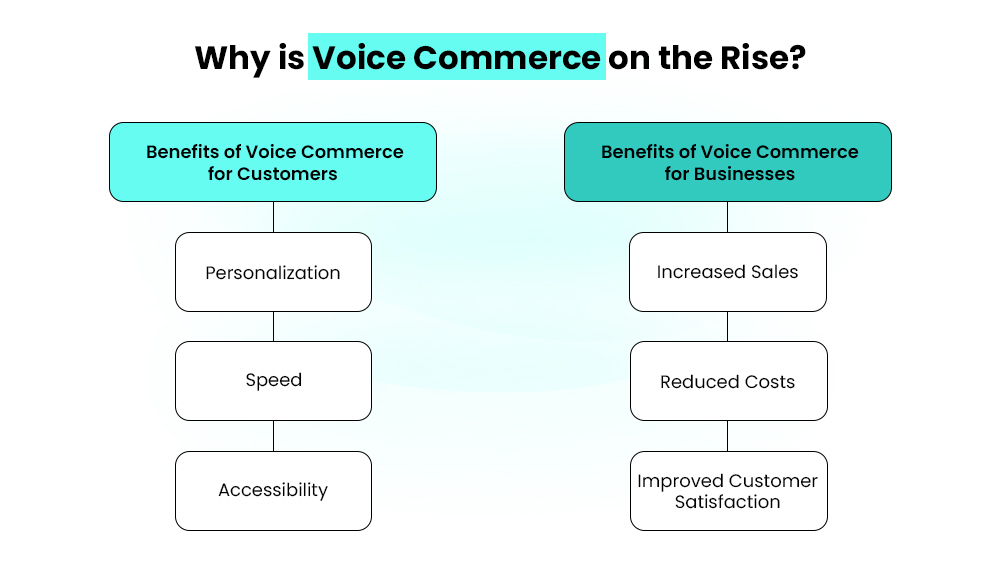
5 Ways Voice Search is Changing eCommerce Marketing
A voice search platform or app should be at the heart of your customer experience strategy. Here’s a list of reasons that show why the eCommerce sector will depend heavily on the future of voice search.
1. Time-Efficient
When it comes to typing a query, local voice search is quick and effective. Compared to typing, voice technology empowers you to communicate faster and obtain results more swiftly.
You can also shop on-the-go even with a voice search while being engaged in another activity such as cooking or driving. According to studies, 62% of the respondents would use their voice assistant while multitasking despite being accessible everywhere.
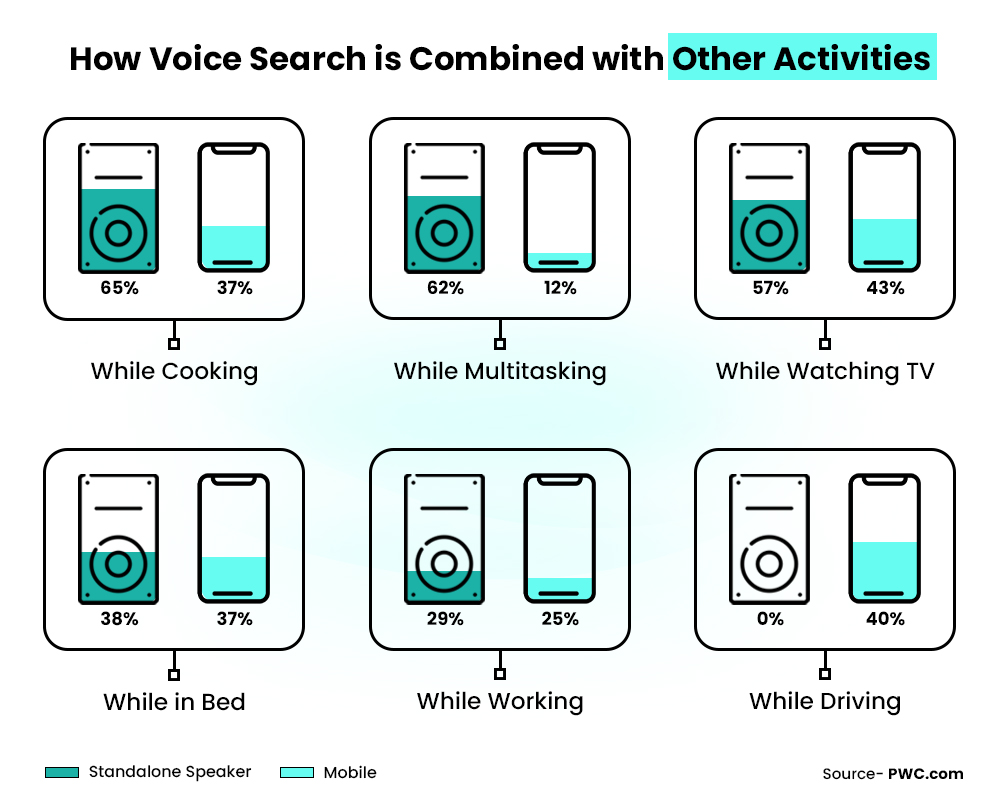
2. Enhanced Customer Experience
Implementing voice search and SEO into your business could improve your customer experience tremendously. You are more likely to gain happy customers by doing so and they will also recommend your site to others.
With brand building, voice assistants can help you because it is something you can boast about. For instance, you can tell your customers that you offer voice commerce shopping, and then people who are already using it might be convinced to use your products.
Moreover, people who don’t know about voice commerce might be happy to try this method in your eCommerce store. If they like it, they’ll come back or recommend your online store to others, resulting in more website traffic and leads.
3. Personalized Shopping
With the use of recommendations based on individual preferences, voice search in eCommerce personalizes the shopping experience. Because emails with shopping basket reminders and personalized recommendations are pretty much standard now.
For instance, if a customer orders through Alexa voice search daily using AmazonFresh to buy items, the voice assistant can suggest items based on the preferences then. Voice commerce can make the task even easier for the user if an order has to be repeated.
When using personalized experiences, marketers see an average increase of 20% in sales.
4. Easy to Review
For businesses, collecting reviews hasn’t been easy but with eCommerce voice search, sharing feedback is a breeze for customers. The convenience and ease of reviewing make them more meaningful and genuine which in turn helps the product.
Voice assistants ask for specific questions and ratings, as against the time-consuming task of typing long feedback, without the hassle of having to log in.
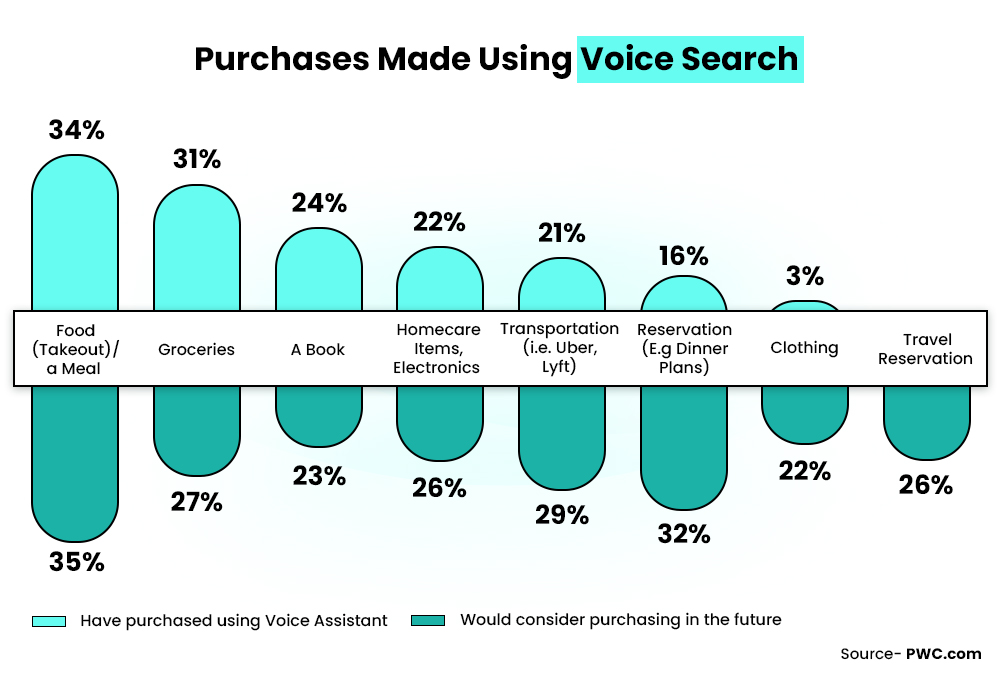
5. Voice Search Rankings Drive More Traffic
Optimizing for voice search engine rankings can significantly boost eCommerce traffic. Unlike traditional searches, voice queries are more conversational and often framed as questions. This means businesses must focus on long-tail keywords and natural language to appear in featured snippets, which voice assistants prioritize.
With over 50% of the US population engaging with voice search devices daily, making it a crucial aspect of eCommerce marketing.
Voice-optimized content enhances user experience, leading to higher engagement and conversions. Ecommerce brands that adapt to voice search trends will attract more potential buyers, ensuring they stay ahead in an increasing voice-driven marketplace.
How To Optimize Your eCommerce Site For Voice Search?
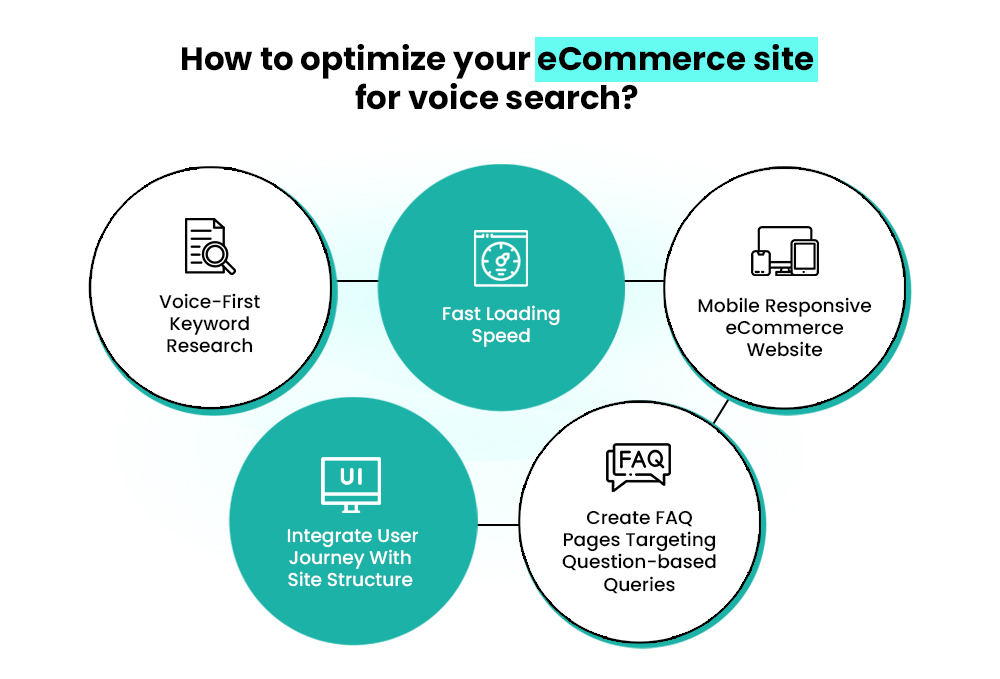
The great thing about the eCommerce marketing landscape is that you always have the flexibility for voice search optimization of the site. Here are some important strategies to help your website flourish in the world of voice shopping.
A. Voice-First Keyword Research
To cater to recognition among the users, answer-focused search results are essential. When you optimize for voice search, the proper keyword utilization and development are necessary.
For keyword generation, here are some tips and hacks:
- Question Keywords- Instead of phrases, most of the eCommerce voice searches are in the form of questions because it enables ‘talking’. For example, if a user is required to find a nearby bakery shop, he says “Okay Google, where is the bakery near me?” When he types the same, the phrase mostly is “Bakery near me”.
- Long Tail Keyword- Focus on long tail keywords because they have low search volume and less competition. Users avoid long-tail keywords while typing on the other hand, contextual long-tail keywords are often used with Google voice searching. Therefore, they should have optimum use.
- Natural And Conversational- It’s compulsory to keep the content completely natural and conversational to get more impressions. This language is used widely in day-to-day conversations and prefer the exact while online voice searching.
In natural language, almost 70% of requests to the Google Assistant are expressed, not the typical keywords people type in a web search.
B. Fast Loading Speed
The entire eCommerce web development exercise is more about fast loading speed compared to anything else. It improves user experience and engagement on your website, leading to user purchasing.
Google needs to provide an instant answer when a user conducts voice search queries. Google will ignore your website page if it loads slowly. To rank high among your competitors, it’s a key feature.
Here are some tips to improve website speed:
- Clear broken links
- Select a fast web hosting service
- Reduce images size
- Reducing redirects
- Utilize caching
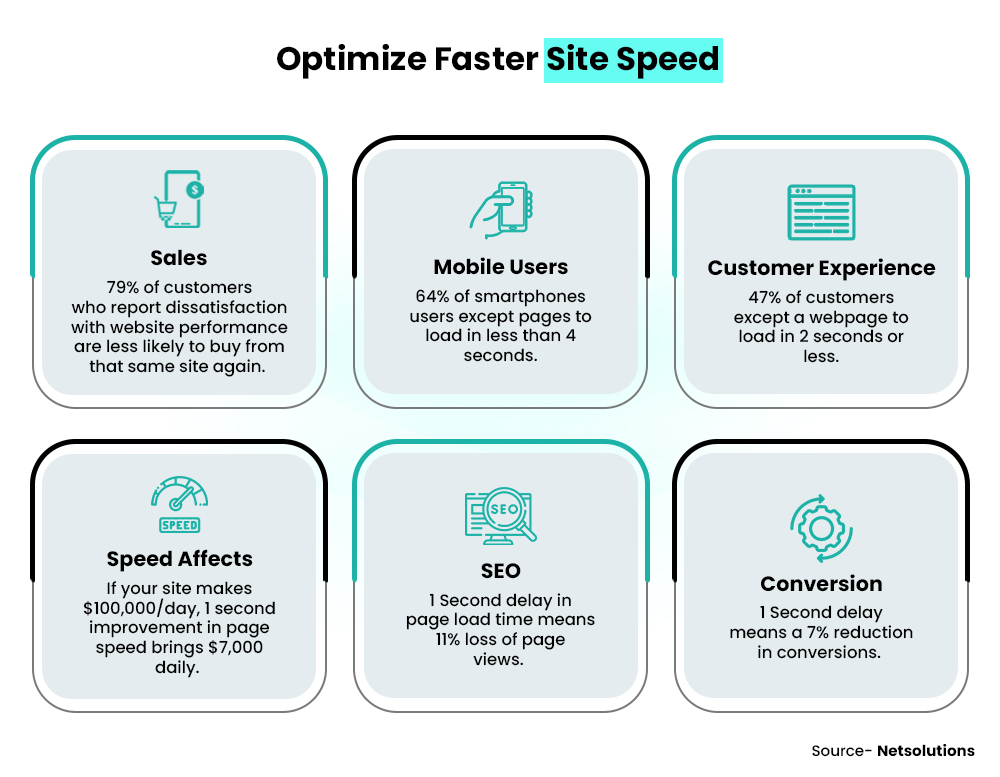
C. Mobile Responsive eCommerce Website
Mobile phones have revolutionized how we access information and shop, and their importance continues to grow. With one in five voice searches happening on mobile, a mobile-first approach is crucial for eCommerce success.
Responsive web design is no longer optional; it’s essential for reaching today’s consumers. This format, vital for everything from blogs to full-scale eCommerce sites, allows businesses to connect with both desktop and mobile audiences through targeted campaigns. A seamless mobile experience is key to conversions.
A study by Google found that 61% of mobile users move to another site if they don’t find what they’re looking for.
Responsive design directly addresses this, ensuring a positive user journey regardless of the device. Yet, surprisingly, only a small fraction of businesses have fully embraced responsive websites.
By prioritizing mobile responsiveness, eCommerce stores can avoid lost revenue, improve customer satisfaction, and capitalize on the ever-growing mobile market.
D. Create FAQ Pages Targeting Question-based Queries
Creating FAQ pages targeting question-based queries is crucial for voice search SEO. Since eCommerce voice searches are conversational, users often ask full questions rather than using short keywords. FAQ pages provide a platform to directly answer these questions, improving your chances of appearing in voice search bar results.
Think about the common questions your customers ask about your products or services. Structure your FAQs using natural language, mirroring how people speak. For example, instead of “Product X Price”, use “How much does product X cost?” This conversational approach aligns with search patterns.
Don’t forget to use schema markup to help search engines understand the content of your FAQ pages further enhancing your voice search optimization efforts. A well-structured FAQ page is a powerful tool for capturing traffic and improving the overall customer experience.
E. Integrate User Journey With Site Structure
Providing a smooth and satisfying user experience is always a priority Adjusting your site’s structure can make it easier for voice search users to navigate.
While making these changes, also consider how link-building SEO can strengthen your strategy.
- Navigation- Ensure your eCommerce site’s navigation aligns with common voice search queries. This helps users find what they need quickly.
- Schema Markup- Adding schema markup enhances your site’s structured data, helping search engines recognize special events, new products, and discounts more easily.
- XML Sitemap- A well-structured ensures that both users and search engines can find important information quickly, improving search rankings and user experience.
Key Challenges For Voice Search In eCommerce Marketing

Here are a few key challenges for voice search in eCommerce marketing that businesses need to resolve:
1. Privacy Concerns With Voice-Enabled Devices
While voice searching technology is revolutionizing eCommerce, it also raises significant privacy concerns among users. Many are worried about how their voice data is collected, stored, and utilized by these devices.
A survey by Secure Data Recovery found that nearly 60% of respondents were at least occasionally concerned about privacy when using voice assistants.
These concerns arise from the fact that voice-enabled devices often have always-on microphones, continuously listening for activation commands. This constant listening capability leads to fears about unauthorized recordings and potential misuse of personal information.
For example, there have been instances where devices inadvertently captured private conversations, leading to significant privacy breaches.
For eCommerce businesses utilizing voice search, it’s crucial to address these privacy issues proactively. Implementing transparent data collection policies, ensuring robust data security measures, and providing users with clear options to manage their data can help build trust.
2. Accuracy And Understanding
For voice search to be truly effective in eCommerce, accuracy and understanding are crucial. Users expect precise and relevant results when searching for products, making it essential for businesses to optimize their content for natural language queries.
A SEMrush study found that the overall accuracy of voice search is approximately 95%, showing significant advancements in AI-driven search capabilities.
However, challenges remain, especially with complex or unclear queries. Voice assistants rely on context, intent, and conversational language to deliver accurate results making structured data and schema markup essential for improving understanding.
For eCommerce brands, ensuring product descriptions, FAQs, and Metadata are optimized for conversational search patterns enhances visibility in voice search SEO. As voice assistants continue to improve, businesses that adapt to these trends will provide seamless shopping experiences and increase conversions in the growing voice-drive digital marketplace.
3. SEO Challenges With Voice Search Algorithms
Voice search optimization presents unique SEO challenges due to the way voice assistants process queries. Unlike traditional text searches, voice queries are longer, more conversational, and often phrased as questions. This requires businesses to adapt by using long-tail keywords, natural language, and structured data to improve visibility.
Another challenge is that voice search often provides a single top result, making competition for the top spot even more intense. Additionally, algorithms continuously evolve, requiring businesses to stay updated on ranking factors.
By focusing on featured snippets, schema markup, and local SEO, eCommerce brands can overcome these challenges and improve their chances of ranking higher in voice search SEO results.
Conclusion
Marketers and businesses understand that search trends are constantly evolving, and the rise of voice search for eCommerce is reshaping the digital landscape once again. As voice-driven and local searches become more prevalent, businesses of all sizes must adapt to stay competitive.
Optimizing every page for local, mobile, and voice searches increases the chances of ranking higher, attracting more customers, and staying ahead of competitors. A well-optimized site enhances user experience, improves visibility in search results, and drives conversions.
At Mastroke, our digital marketing experts will provide you with a refined strategy and help you maximize growth in this rapidly changing marketplace.
